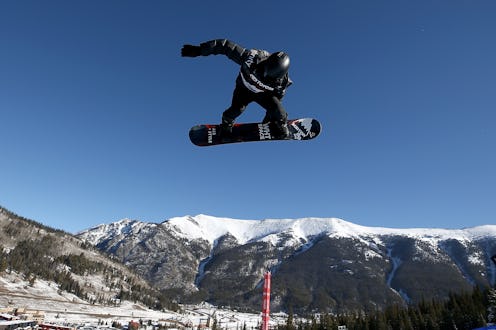Life
Here’s The Number Of Hours You Have To Sleep If You’re An Olympic Athlete

Athletes may be famous for what they do when they're awake, but how much Olympians sleep is just as closely regulated as everything else in their lives. At the elite level, the difference between taking a place on the podium and fading into obscurity can be a matter of seconds. Athletes are very aware of this, and many of them calculate every aspect of their lives outside of training to optimize their performance on the big day. Diet tends to get the most attention — remember the rumor that swimmer Michael Phelps ate 12,000 calories a day before the 2008 Beijing games? — but some experts believe that sleep can make or break an athlete's performance.
"We know that sleep loss is going to create significant detriments in performance," Dr. Mark Rosekind explained on WebMD. Unfortunately, the jet lag caused by international travel, not to mention the stress of competing for the world to see, can disrupt an athlete's sleep patterns if they're not careful. For one thing, sleep is instrumental in muscle recovery, according to the National Institute of Health, and missing bedtime can slow the process down. For another, studies have shown that sleep deprivation can interfere with athletes' focus and energy levels during game time.
Clearly, sleep is an important factor in athletic performance, but how much is enough? Generally speaking, most seem to aim for the standard eight hours a night. Madison Hughes, a Team USA rugby player, told HuffPost Rise that he used to be a night owl, but when he noticed his performance on the field suffering after a late night, he started making a point of getting more rest. Before the Rio games, he said he was averaging eight hours of sleep. According to Van Winkle's, Alpine skier Travis Ganong, cross-country skier Kikkan Randall, and former gymnast Shannon Miller all say they try to get eight hours a night, minimum. If that means they have to shift around their schedule, so be it.
"When I go to bed and when I wake up all depends on my schedule for the next day, but when we’re training super early before the sun rises, I go to bed early," Ganong told Van Winkle's.
Beach volleyball player Phil Dalhausser told Van Winkle's that when his schedule allows, he prefers to be in bed by 11 p.m. and wake up around 8 a.m. — a total of nine hours a night. No wonder he has enough energy to be a star volleyball player.
But athletes don't always get all their rest at once. Swimmer Ryan Lochte is a famous champion of the midday snooze, he told USA Today, but several other Olympians have spoken about the importance of naps. Cammile Adams, his fellow Team USA swimmer, told Pop Sugar she takes long naps before strength training. According to the Press of Atlantic City, when rower Sam Ojserkis is training, he always takes a nap between his morning practice, which begins at 6:30 a.m., and the afternoon one. Chris Creveling, a speed skater who won a silver medal at Sochi in 2014, told Van Winkle's that his routine is too hectic to stick to a sleep schedule, and he relies on naps to get him through tough training periods.
"As athletes, our lives tend to be pretty busy so there isn’t much time for resting. When we’re traveling overseas that routine changes drastically. ... If I had a hard training the day before, which is usually the case, it’s definitely important for me to nap. I’ll nap for 20 to 40 minutes, and that’s enough time for your body to recuperate and it allows your mind to calm as well."
The Olympic Village might have a reputation for being a traveling party town, but apparently, a good portion of athletes' time there is spent snoozing. Something tells me they're dreaming of gold medals.